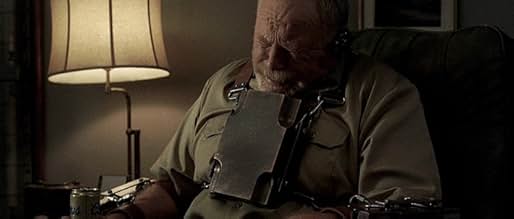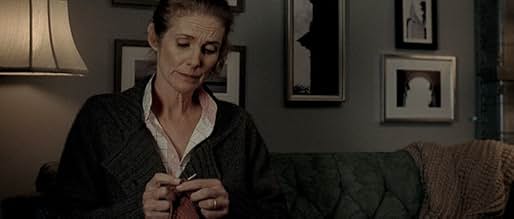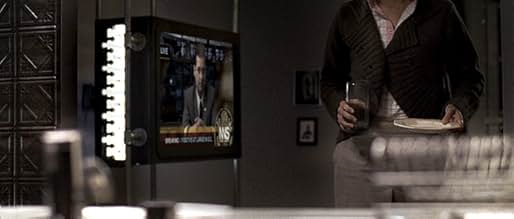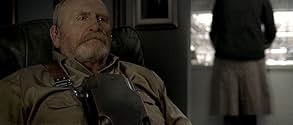A short film adaptation of Kurt Vonnegut's Harrison Bergeron, 2081 depicts a dystopian future in which, thanks to the 212th Amendment to the Constitution and the unceasing vigilance of the U... Read allA short film adaptation of Kurt Vonnegut's Harrison Bergeron, 2081 depicts a dystopian future in which, thanks to the 212th Amendment to the Constitution and the unceasing vigilance of the United States Handicapper General, everyone is "finally equal...." The strong wear weights,... Read allA short film adaptation of Kurt Vonnegut's Harrison Bergeron, 2081 depicts a dystopian future in which, thanks to the 212th Amendment to the Constitution and the unceasing vigilance of the United States Handicapper General, everyone is "finally equal...." The strong wear weights, the beautiful wear masks and the intelligent wear earpieces that fire off loud noises to ... Read all
- Director
- Writers
- Stars
- Narrator
- (voice)
- Lead HG Man
- (as James Burns)
- 'Prima' Ballerina
- (as Becky King)
- Additional Ballerina
- (as Chelsea Hacket)
- Director
- Writers
- All cast & crew
- Production, box office & more at IMDbPro
Featured reviews
This film and story is a masterpiece. Written in a time where the notion of equality was being pushed, filmed in a time decades later where the notion was resurrected by divisive losers, rewatched in an era where sick people are trying to tell healthy people they are just as healthy as they. A time in which New York ends their gifted education programs, because such programs are "racist". The racism of low expectations continues on.
We are not equal.
As such, we find ourselves observing a couple: the wife is the mindless religious type, who never ponders on anything that may make her uncomfortable; never questions anything, let alone challenge authority; and who does not require any handicap as she is considered the standard of normalcy. Her husband, on the other hand, is heavily handicapped, and, via various cinematic techniques in conjunction with technical handicapping mechanisms, we are shown how these handicaps manifest themselves for the affected individual. In the case of the man we are observing, they seem to interrupt his reflections on past memories that the Handicapper General feels could lead to acts of dissent.
We find out more of what these memories are about when a "Breaking News" story interrupts the program he is watching to announce that "suspected Anarchist" Harrison Bergeron has escaped from custody. Arrested several years ago, Bergeron was charged with "propagandous vandalism, broadcast piracy, refusal to report for his handicapping evaluations, and blatant removal of his handicaps in a public place." The newscaster continues by stating that he is," an athlete and genius. Is extremely under-handicapped and considered to be dangerous."
When the regularly scheduled program returns, something is not right. Immediately the man whose room we are watching from whispers, "Harrison". Suddenly, a mech-Jesus-esque man that looks like he just escaped from a mental institution, but was unable to fully remove all the restraint mechanisms, takes over the stage, announcing that "there is a bomb in the theatre, and the detonator is in my hand". It's Bergeron; "the greatest man you've never known", and with a sense of utopian pride he rips off his handicaps after having orated a moving soliloquy meant to inspire the masses into throwing off their handicaps and joining him in a revolution against the oppressive system and Handicapper General.
In a last ditch effort to inspire the masses (while still being broadcast) Bergeron chooses a woman, gets her to remove her handicaps and together they show what can be done when given a chance, without handicaps. Subsequently we watch the counter-revolutionary police force move in, attempt to disable the broadcast, and the bomb.
Will Bergeron be successful in his attempt to catalyze an uprising, or will Counter-Revolutionary forces quell the revolution and maintain their debilitating stranglehold on power? At just over 26 minutes, Chandler Tuttle's interesting take on Kurt Vonnegut Jr's tale of absurdity- "Harrison Bergeron"- is well worth a watch, especially if you are a fan of dystopian films like I am. It's nicely shot with some funny moments, and worth it alone for Bergeron's rant. 6.5 out of 10.
The cast is a dream team of some of Hollywood's finest character actors. Among the stellar ensemble James Cosmo's tortured and haunting portrayal of George Bergeron was the most riveting, and with a cast like this that is really saying something. The role of Harrison Bergeron is played by the memorably named Armie Hammer who delivers the best monologue I've seen in a long time. Patricia Clarkson's narration is also superb. The casting truly could not have been more perfect.
Lee Brooks' score is superlatively performed by the Kronos Quartet and is easily the best I have heard in a short film, putting to shame all but the finest big screen feature scores. I have not enjoyed a score this much since "The Dark Knight," or perhaps "Avatar." The visuals are mesmerizing, dark, and beautiful. Top notch in every regard. This film could not be more relevant to the national conversation today. I still can't believe this is a short film. Are short films supposed to be this good? First time director Chandler Tuttle is a guy to watch.
When you're making a movie based on some sort of successful source material, there are certain questions you must ask yourself. Sometimes, it's not whether you can, but whether you should.
2081 should've been perfect, I'll give it that. I appreciate whoever made this movie for trying so hard, and getting so many others who were also willing to try very hard. I believe that with that kind of work ethic, you can go somewhere.
But when we look at the actual movie, we run into a bit into a bit of a problem, and you don't have to be a detective to notice it. Namely, that the concept is...kind of boring, honestly.
Kurt Vonnegut has never really gotten a good movie adaption, and I think I've run into the reason why. His concepts are just sort of ok. As much as I like his work, and I like the work of whoever made the movie, the film adaptions will always be hindered by the concepts.
The reason the stories worked so well is because of the way Vonnegut wrote them. If something wasn't as amazing or awe-inspiring or bleak as he wanted it to be, he could write it so that it was where he wanted it to be. Directors don't get that luxury.
My point is this: no matter how much work you put into it, this mediocre movie is as good as Kurt Vonnegut movie adaptions will ever be. Stop making them, and let the stories stand for themselves.
Did you know
- TriviaGiven the enormity of the theater house, the filmmakers used inflatable extras for the crowd.
- Quotes
Harrison Bergeron: They had hoped to destroy any trace of the extraordinary in me, and in time I came to share that hope. But the extraordinary, it seems, was simply out of their reach.
- ConnectionsVersion of Between Time and Timbuktu (1972)
Details
- Release date
- Country of origin
- Official site
- Language
- Production company
- See more company credits at IMDbPro
- Runtime
- 25m
- Color






























